Past Fellows and Visiting Faculty
Fall 2010 Fellows
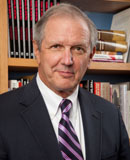 Charlie Gibson, the Reidy Fellow at the Shorenstein Center, is a broadcast television anchor and journalist with over 35 years of experience. He covered the White House and Congress, and anchored major ABC News broadcasts through 11 election cycles. He was anchor of World News with Charles Gibson from 2006 to 2009 and host of Good Morning America from 1987 to 1998 and 1999 to 2006. Gibson’s career spans from 1965 to 2009, with beginnings as the news director for Princeton University’s student-run radio station (WPRB), a radio producer for RKO and a reporter for local television stations. In 1975, he joined ABC News. He was ABC White House correspondent from 1976 to 1977, a general assignment reporter from 1977 to 1981 and House of Representatives correspondent from 1981 to 1987. Gibson was a correspondent and fill-in anchor for World News Tonight with Peter Jennings and substitute anchor on the late-night hard and soft news programs Nightline and World News This Morning. His research will examine the political polarization in Congress and will identify the multiple causes for the current atmosphere of incivility. Paper PDF
Charlie Gibson, the Reidy Fellow at the Shorenstein Center, is a broadcast television anchor and journalist with over 35 years of experience. He covered the White House and Congress, and anchored major ABC News broadcasts through 11 election cycles. He was anchor of World News with Charles Gibson from 2006 to 2009 and host of Good Morning America from 1987 to 1998 and 1999 to 2006. Gibson’s career spans from 1965 to 2009, with beginnings as the news director for Princeton University’s student-run radio station (WPRB), a radio producer for RKO and a reporter for local television stations. In 1975, he joined ABC News. He was ABC White House correspondent from 1976 to 1977, a general assignment reporter from 1977 to 1981 and House of Representatives correspondent from 1981 to 1987. Gibson was a correspondent and fill-in anchor for World News Tonight with Peter Jennings and substitute anchor on the late-night hard and soft news programs Nightline and World News This Morning. His research will examine the political polarization in Congress and will identify the multiple causes for the current atmosphere of incivility. Paper PDF
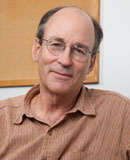 Tracy Kidder is the A.M. Rosenthal Writer-in-Residence at the Shorenstein Center. He works as a freelance writer and has published articles and essays in various periodicals, including The New Yorker, The New York Times and The Atlantic Monthly, where he was for many years a contributing editor. He has taught writing at Smith College and Northwestern University. He has published some short fiction and edited a volume of The Best American Essays, but he has spent the best part of the past 40 years writing the following books of narrative nonfiction: The Soul of a New Machine, House, Among Schoolchildren, Old Friends, Hometown, Mountains Beyond Mountains, My Detachment and Strength in What Remains. He has won The Pulitzer Prize in General Nonfiction, The National Book Award, The Robert F. Kennedy Award, The Ambassador Book Award, The L.L. Winship Book Award and many other literary prizes. Three of his books have been finalists for The National Book Critics Circle Award. He and Richard Todd, his editor of 40 years, are currently working on a book about writing, tentatively entitled Good Prose. He will be working on that project this fall and will also be looking for another narrative subject.
Tracy Kidder is the A.M. Rosenthal Writer-in-Residence at the Shorenstein Center. He works as a freelance writer and has published articles and essays in various periodicals, including The New Yorker, The New York Times and The Atlantic Monthly, where he was for many years a contributing editor. He has taught writing at Smith College and Northwestern University. He has published some short fiction and edited a volume of The Best American Essays, but he has spent the best part of the past 40 years writing the following books of narrative nonfiction: The Soul of a New Machine, House, Among Schoolchildren, Old Friends, Hometown, Mountains Beyond Mountains, My Detachment and Strength in What Remains. He has won The Pulitzer Prize in General Nonfiction, The National Book Award, The Robert F. Kennedy Award, The Ambassador Book Award, The L.L. Winship Book Award and many other literary prizes. Three of his books have been finalists for The National Book Critics Circle Award. He and Richard Todd, his editor of 40 years, are currently working on a book about writing, tentatively entitled Good Prose. He will be working on that project this fall and will also be looking for another narrative subject.
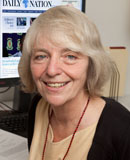 Karen Rothmyer‘s introduction to journalism was running a school newspaper in Kenya as a Peace Corps volunteer. That experience led her to decide on journalism as a career. After earning a master’s degree at Columbia, she worked at news organizations including the AP, The Wall Street Journal, Newsday and The Nation, where she was managing editor for nine years. She is the author of Winning Pulitzers: The Stories Behind Some of the Best News Coverage of Our Time and the recipient of a 1982 IRE award for her investigation of Richard Mellon Scaife, the previously unknown funder of the New Right. She returned to Kenya as a Knight International Journalism Fellow in 2005 and again in 2007, after she and her husband had decided to make Kenya their home. She is now a consulting editor at The Star, a three-year-old national daily, and a contributing editor to The Nation (U.S.). She also teaches at the University of Nairobi and serves on the board of the Tanzania Media Fund. She will be looking at how NGOs influence media coverage of Africa. Paper PDF
Karen Rothmyer‘s introduction to journalism was running a school newspaper in Kenya as a Peace Corps volunteer. That experience led her to decide on journalism as a career. After earning a master’s degree at Columbia, she worked at news organizations including the AP, The Wall Street Journal, Newsday and The Nation, where she was managing editor for nine years. She is the author of Winning Pulitzers: The Stories Behind Some of the Best News Coverage of Our Time and the recipient of a 1982 IRE award for her investigation of Richard Mellon Scaife, the previously unknown funder of the New Right. She returned to Kenya as a Knight International Journalism Fellow in 2005 and again in 2007, after she and her husband had decided to make Kenya their home. She is now a consulting editor at The Star, a three-year-old national daily, and a contributing editor to The Nation (U.S.). She also teaches at the University of Nairobi and serves on the board of the Tanzania Media Fund. She will be looking at how NGOs influence media coverage of Africa. Paper PDF
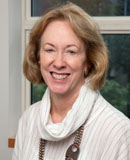 Sandy Rowe is the Knight Fellow at the Shorenstein Center. She was editor of The Oregonian in Portland from 1993 until January 2010. Under her leadership, the newspaper won five Pulitzer Prizes including the Gold Medal for Public Service. The National Press Foundation named Rowe the Editor of the Year in 2003. In 2008, Editor & Publisher magazine named her Editor of the Year. In 2010, the American Society of Newspaper Editors awarded Rowe its National Leadership Award. Rowe chairs the Board of Visitors of The Knight Fellowships at Stanford University and is a board member of the Committee to Protect Journalists based in New York. She is a member of Willamette University’s Board of Trustees and a member of the Medill School of Journalism Board of Visitors at Northwestern University. Rowe served on the Pulitzer Prize Board from 1994–2003 and was its chair in 2002–2003. She is a past president of the American Society of Newspaper Editors. From l984 until April l993, Rowe was executive editor and vice president of The Virginian-Pilot and The Ledger-Star, Norfolk and Virginia Beach, Virginia. The Virginian-Pilot won the Pulitzer Prize for general news reporting, its first in 25 years, under her leadership. She will research how local and regional news organizations can capitalize on digital growth and the explosion of social media to expand accountability coverage. Paper PDF
Sandy Rowe is the Knight Fellow at the Shorenstein Center. She was editor of The Oregonian in Portland from 1993 until January 2010. Under her leadership, the newspaper won five Pulitzer Prizes including the Gold Medal for Public Service. The National Press Foundation named Rowe the Editor of the Year in 2003. In 2008, Editor & Publisher magazine named her Editor of the Year. In 2010, the American Society of Newspaper Editors awarded Rowe its National Leadership Award. Rowe chairs the Board of Visitors of The Knight Fellowships at Stanford University and is a board member of the Committee to Protect Journalists based in New York. She is a member of Willamette University’s Board of Trustees and a member of the Medill School of Journalism Board of Visitors at Northwestern University. Rowe served on the Pulitzer Prize Board from 1994–2003 and was its chair in 2002–2003. She is a past president of the American Society of Newspaper Editors. From l984 until April l993, Rowe was executive editor and vice president of The Virginian-Pilot and The Ledger-Star, Norfolk and Virginia Beach, Virginia. The Virginian-Pilot won the Pulitzer Prize for general news reporting, its first in 25 years, under her leadership. She will research how local and regional news organizations can capitalize on digital growth and the explosion of social media to expand accountability coverage. Paper PDF
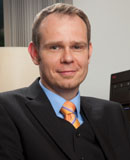 Dietram A. Scheufele is the John E. Ross Chaired Professor in Science Communication at the University of Wisconsin-Madison and Co-Principal Investigator of the NSF-funded Center for Nanotechnology in Society at Arizona State University. Scheufele is a former member of the Nanotechnology Technical Advisory Group to the U.S. President’s Council of Advisors on Science and Technology. Scheufele’s scholarship and teaching have won numerous awards. He has consulted on communication strategy for PBS, the World Health Organization, the World Bank and other corporate and public sector clients in the U.S., China, Malaysia and the U.A.E. He was a tenured faculty member at Cornell University prior to joining the University of Wisconsin. While at the Shorenstein Center, he will explore how interactions among actors in mass mediated, policy and public arenas can contribute to the amplification of risk perceptions about emerging technologies among citizens. Paper PDF
Dietram A. Scheufele is the John E. Ross Chaired Professor in Science Communication at the University of Wisconsin-Madison and Co-Principal Investigator of the NSF-funded Center for Nanotechnology in Society at Arizona State University. Scheufele is a former member of the Nanotechnology Technical Advisory Group to the U.S. President’s Council of Advisors on Science and Technology. Scheufele’s scholarship and teaching have won numerous awards. He has consulted on communication strategy for PBS, the World Health Organization, the World Bank and other corporate and public sector clients in the U.S., China, Malaysia and the U.A.E. He was a tenured faculty member at Cornell University prior to joining the University of Wisconsin. While at the Shorenstein Center, he will explore how interactions among actors in mass mediated, policy and public arenas can contribute to the amplification of risk perceptions about emerging technologies among citizens. Paper PDF
Fall 2010 Visiting Faculty
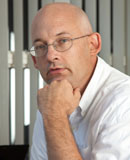 Clay Shirky is the Visiting Murrow Lecturer on the Practice of Press and Public Policy at the Shorenstein Center. He is a writer, consultant and teacher on the social and economic effects of Internet technologies. He teaches New Media as an associate teacher at New York University’s graduate Interactive Telecommunications Program. His courses address the interrelated effects of the topology of social networks and technological networks, how our networks shape culture and vice-versa. He has written and been interviewed extensively about the Internet since 1996. His columns and writings have appeared in Business 2.0, The New York Times, The Wall Street Journal, The Harvard Business Review and Wired. He is the author of Cognitive Surplus and Here Comes Everybody. Shirky is teaching a course entitled New Media and Public Action.
Clay Shirky is the Visiting Murrow Lecturer on the Practice of Press and Public Policy at the Shorenstein Center. He is a writer, consultant and teacher on the social and economic effects of Internet technologies. He teaches New Media as an associate teacher at New York University’s graduate Interactive Telecommunications Program. His courses address the interrelated effects of the topology of social networks and technological networks, how our networks shape culture and vice-versa. He has written and been interviewed extensively about the Internet since 1996. His columns and writings have appeared in Business 2.0, The New York Times, The Wall Street Journal, The Harvard Business Review and Wired. He is the author of Cognitive Surplus and Here Comes Everybody. Shirky is teaching a course entitled New Media and Public Action.

